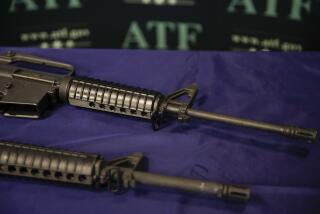Teledyne Agrees to Settle Claim for False Tests on Missile Systems : Military: The company will pay $10 million for misleading results reported by its Newbury Park division on U.S. Stingers.
- Share via
Teledyne has agreed to pay $10 million to settle federal civil claims that its electronics division in Newbury Park falsified tests on aircraft identification systems for U.S. Army Stinger missiles, the government said Wednesday.
Los Angeles-based Teledyne will pay a $5-million fine and spend at least $5 million more to recall, screen and repair 5,900 electronic missile parts tested from 1983 to 1988, according to the U.S. Justice Department.
The Army deployed the surface-to-air Stinger missiles in the Persian Gulf War, but an Army spokesman said that none were fired in combat because few Iraqi planes were encountered.
The electronic systems that were improperly tested--or which were delivered to the Army after failing tests--are used in identifying friendly aircraft, officials said.
“This settlement is intended to ensure that our armed forces have absolute confidence in their equipment, so that casualties attributable to friendly fire do not occur in time of war,” said Assistant Atty. Gen. Frank W. Hunger, chief of the Justice Department’s civil division.
In a press release, Teledyne said that it cooperated fully with the investigation.
There is no record that malfunctions of its IFF--”identification friend-or-foe”--system have led to injury or property damage, the company said.
An Army spokesman said that field tests of the IFF Stinger system have not led to an unusually large number of complaints.
This week’s settlement addresses only electronic components Teledyne built and tested for Stinger missiles under an Army contract.
Teledyne Electronics in Newbury Park also had contracts with the Air Force and Navy to test aircraft identification systems for missiles and other weapons, including the F-16 fighter, officials said.
A Justice Department spokesman would not comment on whether testing for those contracts is being investigated.
Nor would a spokesman for the FBI’s Ventura office, which led the probe of Teledyne’s Army contracts, say whether a broader inquiry is under way.
The settlement follows a two-year investigation that authorities say began when a Teledyne technician tipped the FBI in March, 1991, that he and other technicians had routinely falsified test results for components of the IFF system.
About 2,500 components that failed tests were sold to the Army, and hundreds of other components were improperly tested, he told investigators.
Teledyne admitted in August, 1991, that it had committed testing irregularities, the Justice Department said.
That admission was through a voluntary Pentagon program that encourages defense contractors to disclose past fraudulent activities.
Teledyne maintained Wednesday that the company--not a tip to the FBI--initiated the investigation.
But Justice Department spokesman Joe Krovisky said that the technician’s tip was the catalyst for the FBI inquiry.
“He provided information that showed the problems were much more serious than Teledyne had first indicated,” Krovisky said.
The $10-million settlement represents the latest in a series of legal problems for Teledyne.
Although the nation’s 37th-largest defense contractor, Teledyne has attracted several major lawsuits by the Justice Department.
And the Defense Logistics Agency is considering whether to seek a broad-based suspension or debarment from defense contracts.
More to Read
Inside the business of entertainment
The Wide Shot brings you news, analysis and insights on everything from streaming wars to production — and what it all means for the future.
You may occasionally receive promotional content from the Los Angeles Times.










